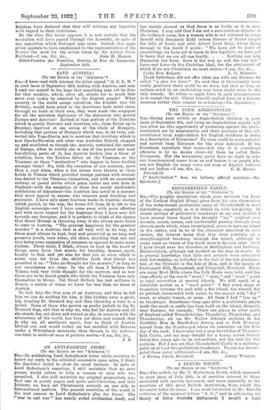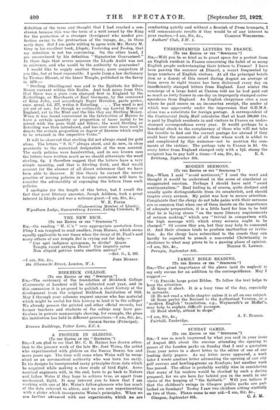A LLOYDS POLICY.
[To THE EDITOR OF THE "SPECTATOR."] SIR,—The article by Mr. T. Herbertson Baird, which appeared in your issue of July 29th, is of peculiar interest to those associated with marine insurance, and more especially to the members of this great British institution, from which the document takes its name. I am most interested in Mr. Baird'e criticism of the mystical letters "S. G.," and in advancing my theory of Salve Guardia (safeguard) I sought a legal
definition of the term and thought that I had reached a con- clusion because this was the term of a writ issued by the King
for the protection of a stranger (foreigner) who needed pro- tection owing to the protraction of the voyage, &c., in those early days. But I am quite willing to agree with Mr. Henry M. Grey in his excellent book, Lloyds; Yesterday and To-day, that my definition is not too convincing. On the other hand, I am unconvinced by his definition "Signatories Guaranteed." In those days that severe measure the Lloyds Audit was not in existence, and who would be the authority to guarantee?
I would like to supply another theory, pure conjecture if you like, but at least reasonable. I quote from a law dictionary by Thomas Blount, of the Inner Temple, published in the Savoy in 1670 :—
" Sterling (Sterlingum) was and is the Epithete for Silver Money currant within this Realm. And took name from this, that there was a pure coin stamped first in England by the Easterlings, or Merchants of East Germany, by the command of King John, and accordingly Roger Hovedon, parte poster, suer. annal. fol. 377, writes it Esterling. . . . The word is not yet out of use; for though we ordinarily say Lawful Money of England, yet in the Mint and the like they say Sterling Money. When it was found convenient in the fabrication of Monies to have a certain quantity or proportion of baser metal to be mixed with the pure Gold and Silver; the word Sterling or Esterling was then introduced, and has ever since been used to denote the certain proportion or degree of fineness which ought to be retained in the respective Coins."
It will be observed that sterling did not always stand for gold alone. The letters "S. G." always stood, and do now, in close proximity to the numerical designatiola of the sum assured. The early policies were handwritten, and in one known case the letters were written much as we should abbreviate the word sterling, Sg. I therefore suggest that the letters have a very simple meaning, and that is Sterling Gold, and that would account for the absence of all direct references that we have been able to discover. If this theory be correct the recent practice of issuing policies in foreign currencies will have to consider the advisability of expunging the letters from such
I apologize for the length of this letter, but I recall the fact that your literary ancestor, Joseph Addison, took a great interest in Lloyds and was a welcome guest.—I am, Sir, &c.,
W. E. FOUND (Underwriting Member of Lloyds). Wyndham Lodge, Gunnersbury Avenue, Baling Common, IV.



































 Previous page
Previous page